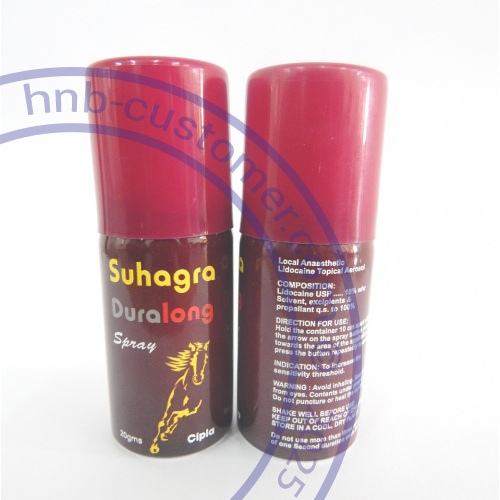

Brand(s):
Suhagra Duralong
Manufacturer:
Cipla Limited
Disease(s):
Pain
Suhagra Duralong
- 20g
-
Suhagra Duralong 1 spray$ 26.95
-
Suhagra Duralong 2 sprays$ 39.95
-
Suhagra Duralong 3 sprays$ 49.95
-
Suhagra Duralong 4 sprays$ 59.95
-
Suhagra Duralong 5 sprays$ 69.95


Lidocaine topical
What is this medicine?
LIDOCAINE is a local anesthetic (numbing medication). It works by blocking nerve signals in your body and used to o get rid of embarrassments like premature ejaculation or erectile dysfunction while in bed or to reduce pain or discomfort caused by skin irritations such as sunburn, insect bites, poison ivy, poison oak, poison sumac, and minor cuts, scratches, or burns. Lidocaine topical is also used to treat rectal discomfort caused by hemorrhoids.
Lidocaine topical may also be used for purposes not listed in this medication guide.
What should I tell my health care provider before I take this medicine?
You should not use lidocaine topical if you are allergic to any type of numbing medicine.
Fatal overdoses have occurred when numbing medicines were used without the advice of a medical doctor (such as during a cosmetic procedure like laser hair removal). However, overdose has also occurred in women treated with a numbing medicine before having a mammography.
Be aware that many cosmetic procedures are performed without a medical doctor present.
To make sure lidocaine topical is safe for you, tell your doctor if you have:
-
liver disease; or
-
if you take a heart rhythm medicine.
FDA pregnancy category B. Lidocaine topical is not expected to harm an unborn baby. Tell your doctor if you are pregnant or plan to become pregnant during treatment.
It is not known whether lidocaine topical passes into breast milk or if it could harm a nursing baby. Tell your doctor if you are breast-feeding a baby.
How should I take this medicine?
Use this medicine exactly as directed on the label, or as it has been prescribed by your doctor. Do not apply this medicine in larger amounts than recommended.
Do not take by mouth. Lidocaine topical is for use only on the skin. If this medicine gets in your eyes, nose, mouth, rectum, or vagina, rinse with water.
Use the smallest amount of medicine needed to numb the skin or relieve pain. Your body may absorb too much of this medicine if you use too much, if you apply it over large skin areas, or if you apply heat, bandages, or plastic wrap to treated skin areas. Skin that is cut or irritated may also absorb more topical medication than healthy skin.
Do not apply this medicine to swollen skin areas or deep puncture wounds. Avoid using the medicine on skin that is raw or blistered, such as a severe burn or abrasion.
Do not cover treated skin unless your doctor has told you to.
Lidocaine topical may be applied with your finger tips or a cotton swab.
If your medicine comes with patient instructions for safe and effective use, follow these directions carefully. Ask your doctor or pharmacist if you have any questions.
What may interact with this medicine?
It is not likely that other drugs you take orally or inject will have an effect on topically applied lidocaine. But many drugs can interact with each other. Tell each of your health care providers about all medicines you use, including prescription and over-the-counter medicines, vitamins, and herbal products.
What should I watch for while taking this medicine?
Do not allow this medicine to come into contact with your eyes. If it does, rinse with water.
Avoid touching the sticky side of a lidocaine skin patch while applying it.
Avoid accidentally injuring treated skin areas while they are numb. Avoid coming into contact with very hot or very cold surfaces.
What side effects may I notice from this medicine?
Get emergency medical help if you have any of these signs of an allergic reaction: hives; difficulty breathing; swelling of your face, lips, tongue, or throat.
Call your doctor at once if you have:
-
severe burning, stinging, or irritation where the medicine was applied;
-
swelling or redness;
-
sudden dizziness or drowsiness after medicine is applied;
-
confusion, blurred vision, ringing in your ears; or
-
unusual sensations of temperature.
Common side effects include:
-
mild irritation where the medication is applied; or
-
numbness in places where the medicine is accidentally applied.
What happens if I miss a dose?
Since lidocaine topical is used when needed, you may not be on a dosing schedule. If you are on a schedule, use the missed dose as soon as you remember. Skip the missed dose if it is almost time for your next scheduled dose. Do not use extra medicine to make up the missed dose.
What happens if I overdose?
Seek emergency medical attention.
An overdose of numbing medicine can cause fatal side effects if too much of the medicine is absorbed through your skin and into your blood. Symptoms may include uneven heartbeats, seizure (convulsions), slowed breathing, coma, or respiratory failure (breathing stops).
Lidocaine applied to the skin is not likely to cause an overdose unless you apply more than the recommended dose.
Improper use of lidocaine topical may result in death.
Where can I keep my medicine?
Store at room temperature away from moisture and heat.

















